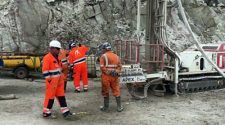Mayor Lori Lightfoot’s Administration said in a court filing Thursday that residents’ health may be harmed if the city issues an operating permit to a car-shredding operation on the Southeast Side — as its owners have demanded — before environmental studies can be completed.
The statement was made in filings for a lawsuit brought by the owners of General Iron, now rebranded as Southside Recycling, which is suing the city for delaying a process that would allow the shredding facility to open at East 116th Street along the Calumet River. But in the filing, the city even went as far as calling one of the company’s legal arguments “the equivalent of a cloud of shredder fluff” — a mocking reference to how the industry refers to the byproducts from their industrial operations.
Last month, Lightfoot announced that the permitting of Southside Recycling was suspended at the request of President Joe Biden’s Environmental Protection Agency chief Michael Regan. Reserve Management Group shortly after sued the city, saying it reneged on an agreement that the company would move General Iron from Lincoln Park and secure the permit to operate on the Southeast Side as long as it followed procedures and a timeline for the relocation.
RMG is asking a judge to force the city to issue the permit, claiming it will suffer great financial harm if it cannot start operating the facility, which will shred junked cars, appliances and other scrap metal so the metals can be reused.
In its new filing in federal court in Chicago, the city said the company is not entitled to a permit and the discretion to issue the operational go-ahead is up to city Health Commissioner Allison Arwady. Giving the company the green light before pollution studies are done potentially hurts the health of nearby residents, the filing said. The city urges Judge Robert Dow Jr. to reject the company’s motion and noted that the EPA-requested air pollution studies will ultimately determine whether the shredding facility can operate safely.
“By short-circuiting the environmental review process that EPA has requested and to which the City has committed, environmental hazards may ensue that are harmful to the City’s residents,” city lawyers said in their filing.
RMG is expected to file its response in court next week. The company has said it has provided its own air modeling and has followed the government procedures. It has also said that a two-page agreement signed by the city and RMG and General Iron clearly laid out a plan to allow the new facility to begin operations by now. RMG signed the agreement with the city before it acquired General Iron in 2019.
Strong community protest, including a hunger strike, has brought much attention to the city and its longtime zoning and land-use practices. Those practices have drawn a civil rights investigation by federal housing authorities who have also asked the city to hold off on issuing the RMG permit.
In its filing, the city said RMG is trying “to create the impression that this matter is a routine dispute about entitlement to build under existing zoning classifications and run-of-the-mill permitting processes. However, the type of operation at issue in this case (a gigantic metal shredder to recycle, among other things, defunct automobiles) implicates complex environmental concerns.”
Those complexities, city lawyers wrote, attracted “high-level federal concerns based on concepts of environmental justice.”
Also, this week several residents who previously sued the city in a separate civil rights complaint and later withdrew their suit, filed a motion to support the city as it defends itself against RMG.
Brett Chase’s reporting on the environment and public health is made possible by a grant from The Chicago Community Trust.

















